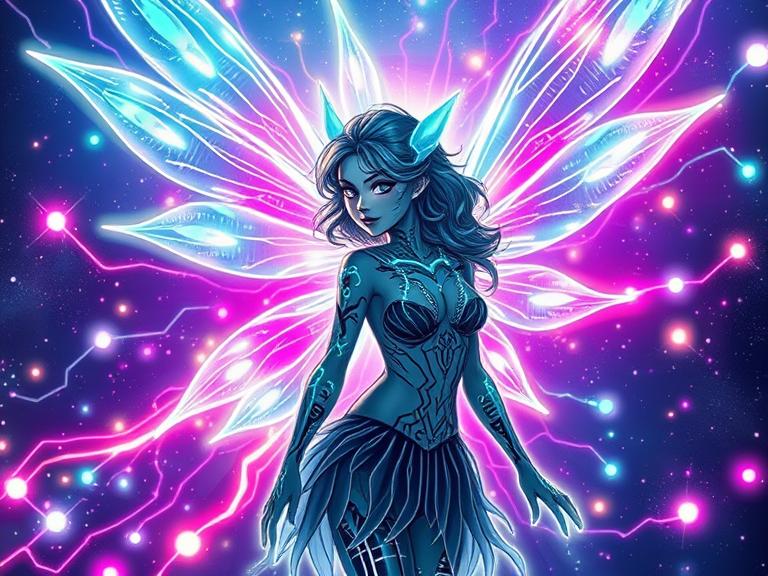Drawing fairies isn’t just about creating pretty pictures – it’s about unlocking a world where imagination meets art, and every stroke of your pencil can transport you to enchanted realms.
Whether you’re helping kids explore their creativity or you’re an adult rediscovering the joy of artistic expression, fairy illustrations offer the perfect blend of whimsy and technical challenge.
Why Fairy Art Captivates Artists of All Ages
There’s something undeniably enchanting about fairy artwork that draws people in like moths to a flickering flame. These ethereal beings represent freedom, magic, and the beauty of nature – themes that resonate deeply with our human desire to escape the mundane and embrace wonder.
For kids, fairy art becomes a gateway to storytelling and emotional expression. Each fairy they create carries a piece of their imagination, complete with unique personalities and magical powers. Adult artists, meanwhile, find in fairy illustration a meditative practice that combines technical skill with creative freedom.
Cute Fairies Drawings: Adorable Sprites That Melt Hearts
Garden Pixie with Flower Crown
Nothing says “cute” like a tiny fairy adorned with a crown of daisies and roses. This sketch idea focuses on creating oversized eyes that sparkle with mischief, rosy cheeks, and a sweet smile that could charm even the grumpiest garden gnome.
The key to this drawing is proportion – make the head slightly larger than realistic to enhance the cute factor.
Start with a basic circle for the head, then add delicate features. The flower crown can be as simple or elaborate as you like, with petals that seem to dance in an invisible breeze. Don’t forget to add tiny dewdrops on the flowers for extra magical detail.
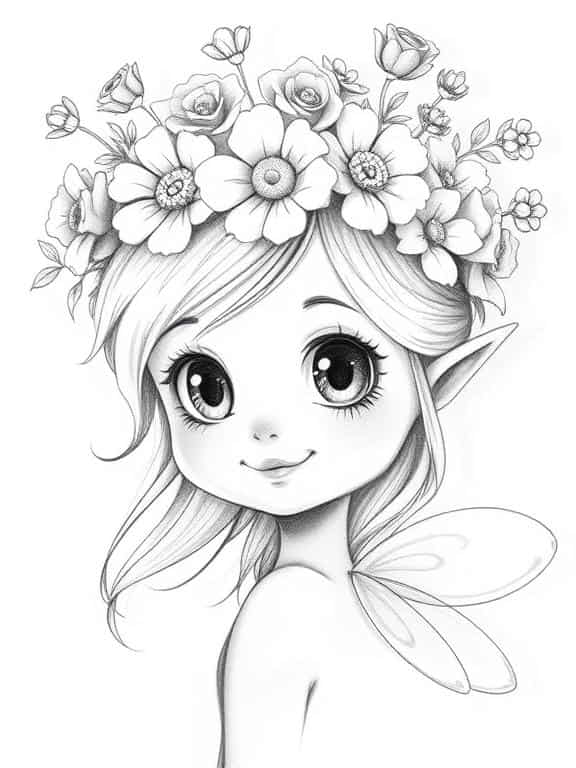
Sleepy Mushroom Fairy
Picture a miniature fairy curled up on a red-capped mushroom, using a leaf as a blanket. This illustration captures the peaceful side of fairy life, perfect for kids who love bedtime stories. The challenge here is conveying comfort and tranquility through body language and facial expression.
Use soft, curved lines to create a sense of coziness. The fairy’s wings can be folded gently against their back, and their expression should be serene and content. Add some fireflies or soft moonlight to enhance the dreamy atmosphere.
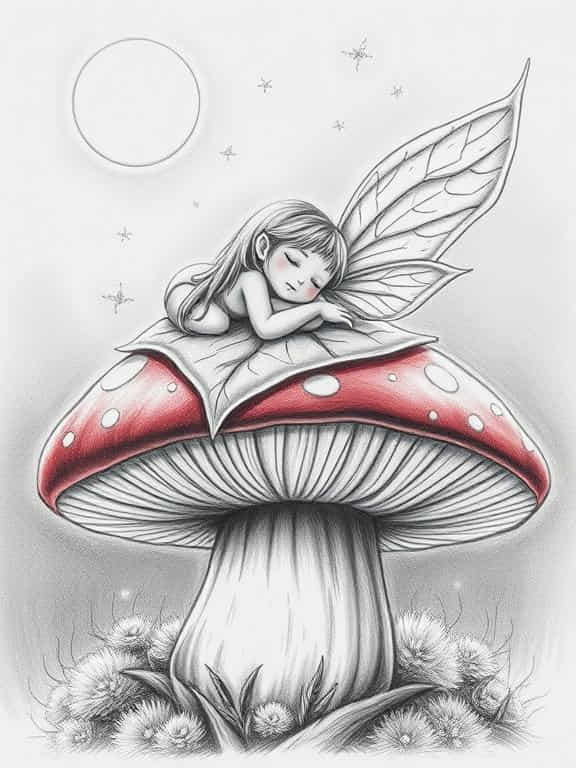
Butterfly Whisperer Fairy
Create a scene where a tiny fairy sits cross-legged, surrounded by butterflies that seem to understand every word she speaks. This drawing celebrates the connection between fairies and nature, emphasizing harmony and friendship.
The fairy’s pose should be open and welcoming, with hands gently extended toward the butterflies. Each butterfly can have unique wing patterns, giving you practice with different textures and designs. This art piece works beautifully in both monochrome and full color.
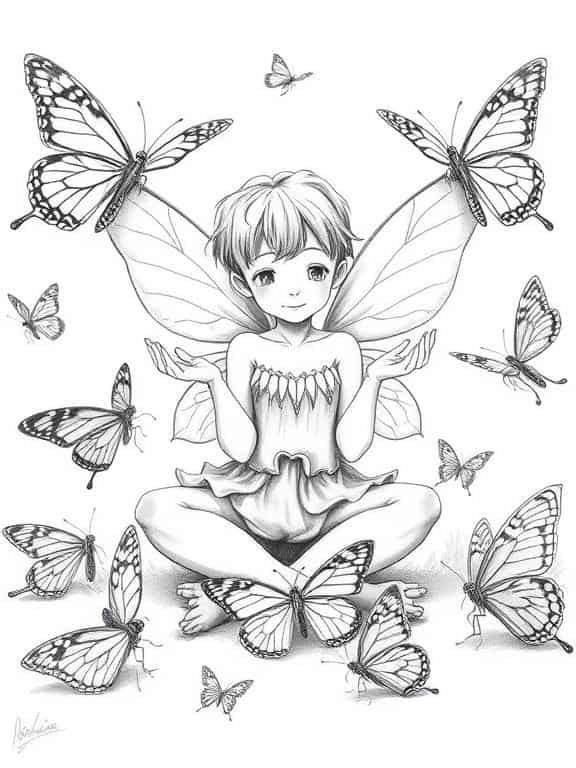
Raindrop Surfing Fairy
Imagine a playful fairy riding a large raindrop like a surfboard, arms outstretched for balance, with a expression of pure joy. This whimsical sketch captures movement and fun, perfect for artists who want to practice dynamic poses.
The key is showing motion through the fairy’s hair and clothing, as well as the splash patterns around the raindrop. Add some smaller raindrops in the background to create depth and atmosphere.
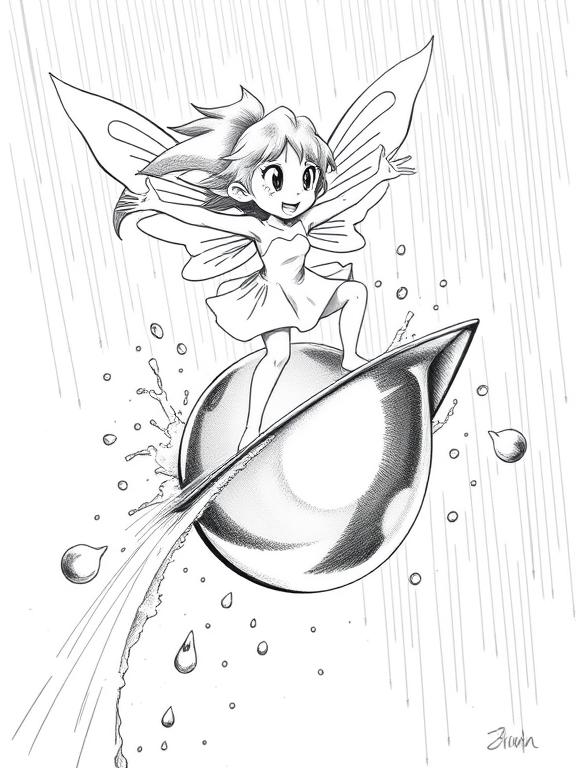
Acorn Cap Fairy
A tiny fairy wearing an acorn cap as a hat, complete with a miniature acorn stem, makes for an absolutely adorable illustration. This concept plays with scale and natural elements, creating a character that feels both magical and grounded in nature.
Focus on the texture of the acorn cap and how it sits on the fairy’s head. The fairy’s expression should be curious and adventurous, perhaps holding a tiny twig like a walking stick.
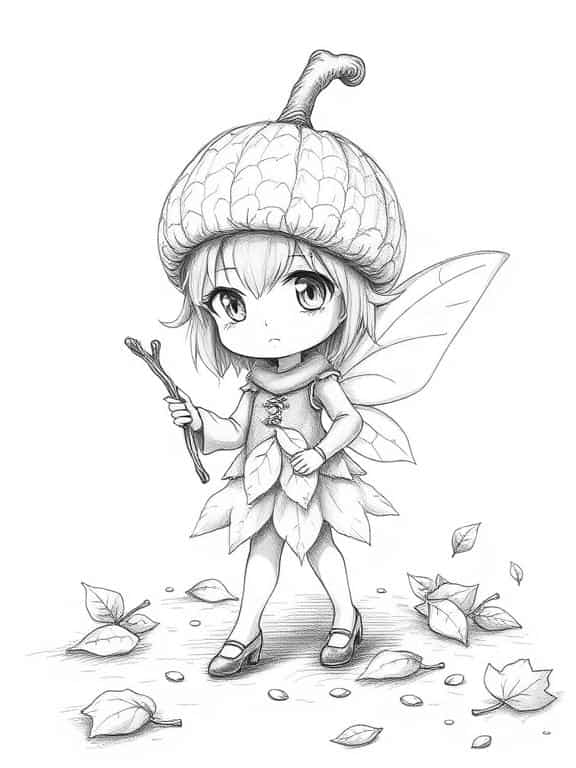
Wings Drawing: Mastering the Art of Fairy Flight
Butterfly-Inspired Wings
The classic approach to fairy wings draws inspiration from butterfly wings, with their intricate patterns and vibrant colors. When creating this drawing, study real butterfly wing structures to understand how the veins create natural divisions and support.
Start with the basic wing shape – typically four wings total, with the upper wings being larger than the lower ones. Add vein patterns that radiate from the base, creating natural sections for different colors or patterns. Consider species like monarchs, swallowtails, or morpho butterflies for color inspiration.
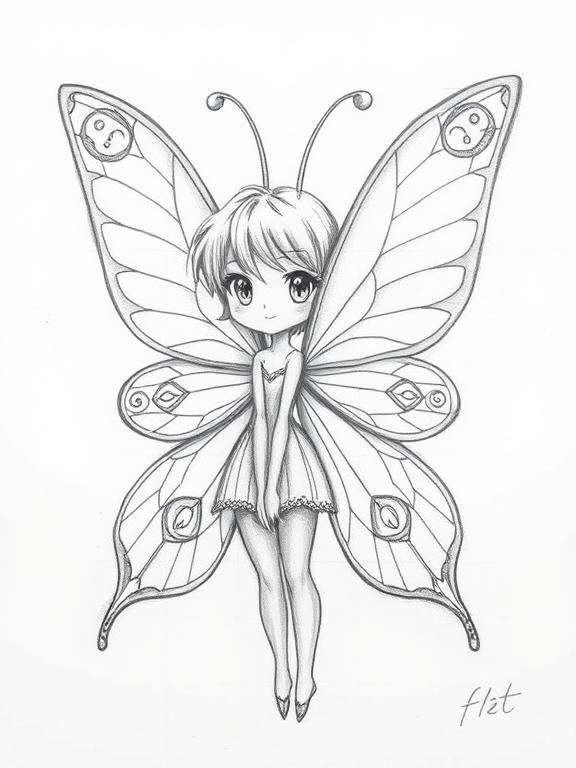
Dragonfly Wings
Dragonfly wings offer a more elegant, translucent option for your fairy art. These wings are characterized by their elongated shape and delicate, net-like vein patterns. They’re perfect for fairies with a more sophisticated or ethereal appearance.
The challenge with dragonfly wings is capturing their transparency while still making them visible. Use light, overlapping lines to create the mesh pattern, and consider adding subtle reflections or highlights to suggest their glass-like quality.
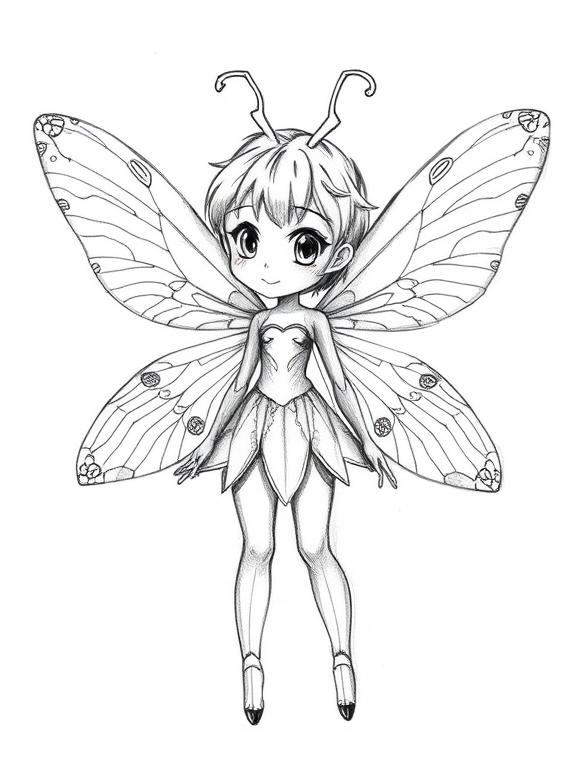
Leaf-Shaped Wings
For earth fairies or forest sprites, leaf-shaped wings create a beautiful connection to nature. These wings can mimic specific leaf types – oak, maple, willow, or even tropical leaves for more exotic fairies.
Pay attention to the natural curves and edges of leaves, including any serrations or lobes. The wing veins should follow the natural vein patterns of real leaves, creating an organic and believable appearance.
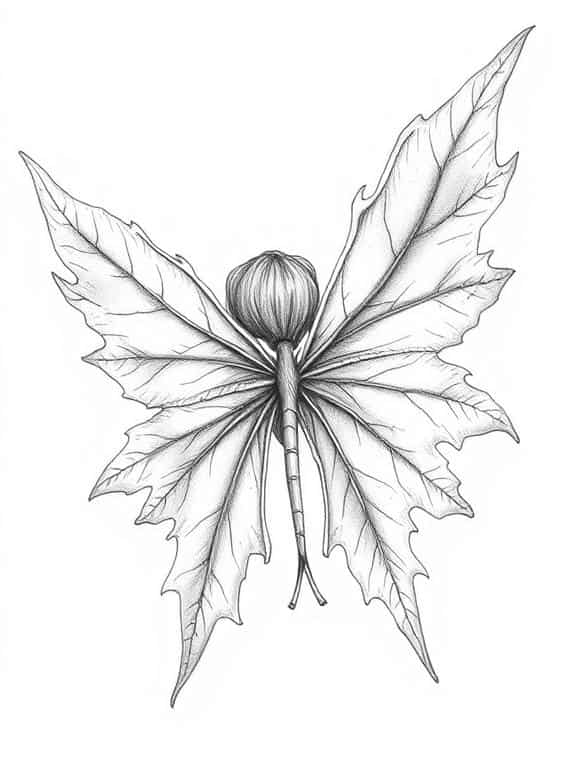
Crystal Wings
For a more fantasy approach, crystal wings add a magical, otherworldly element to your fairy illustration. These wings can be faceted like gemstones, catching and reflecting light in beautiful ways.
Create angular, geometric shapes that still maintain a wing-like silhouette. Add internal reflections and highlights to suggest the crystal’s transparency and brilliance. These wings work particularly well for ice fairies or magical guardians.
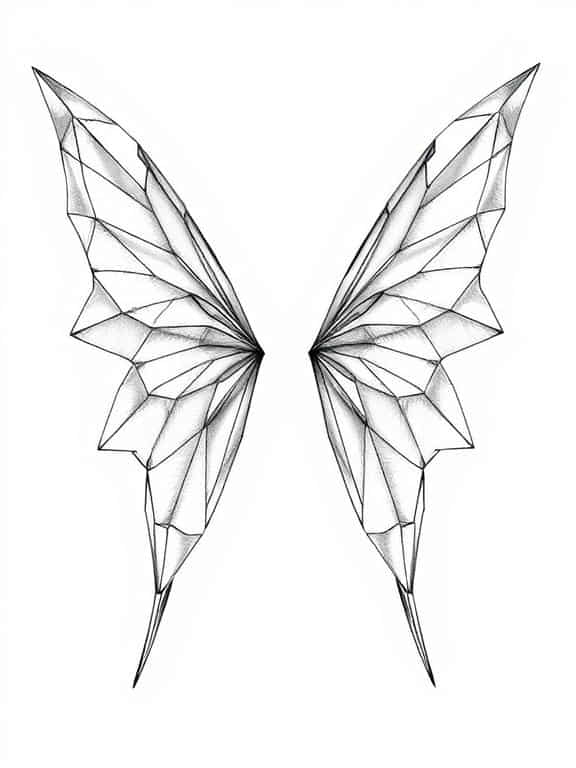
Feathered Wings
Borrowing from angel iconography, feathered wings give fairies a more majestic, powerful appearance. This style works well for larger, more mature fairy characters or those with protective roles.
Layer individual feathers from the wing base outward, with larger primary feathers at the tips and smaller, fluffier feathers near the body. Pay attention to how feathers overlap and cast shadows on each other.
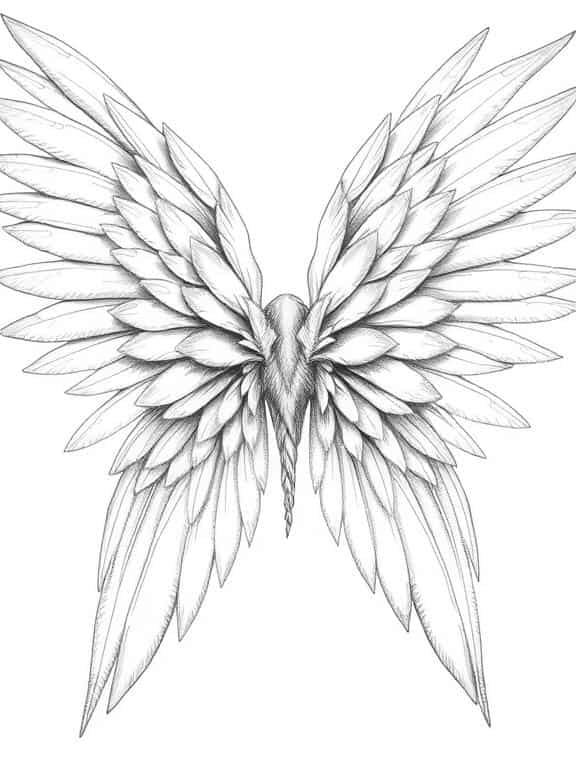
Fairy Art Drawing: Bringing Magic to Life
Woodland Fairy Tea Party
Create an elaborate scene where multiple fairies gather around a mushroom table for an afternoon tea party. This complex drawing allows you to practice multiple fairy poses and expressions while creating a rich, detailed background.
Include various fairy types – some with butterfly wings, others with leaf wings, each with unique clothing and accessories. Add miniature teacups made from acorn caps, flower petal plates, and dewdrop beverages. The scene should feel alive with conversation and laughter.
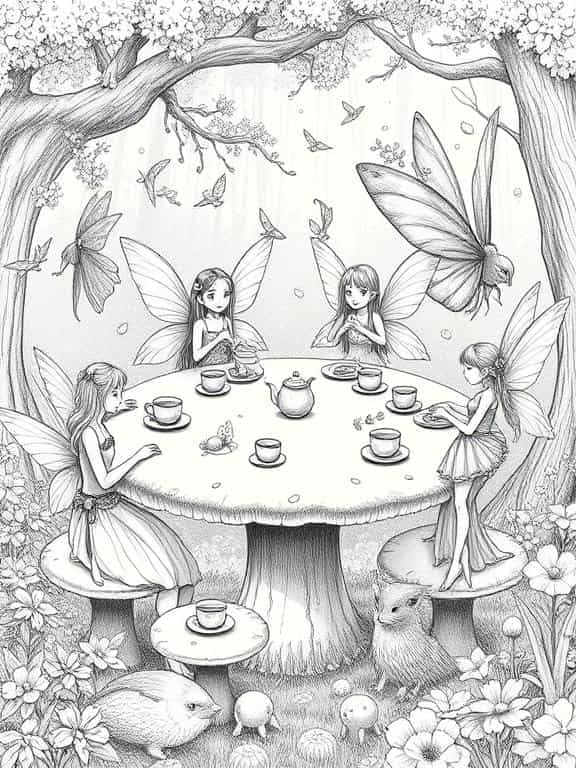
Fairy Godmother Transformation Scene
Capture the magical moment when a fairy godmother waves her wand, surrounded by swirling sparkles and transformation magic. This art piece focuses on movement and energy, with the fairy at the center of a magical whirlwind.
Use flowing lines to show the magic’s movement, and vary the sparkle sizes and intensities to create depth. The fairy’s expression should be focused and powerful, showing the concentration required for such magic.
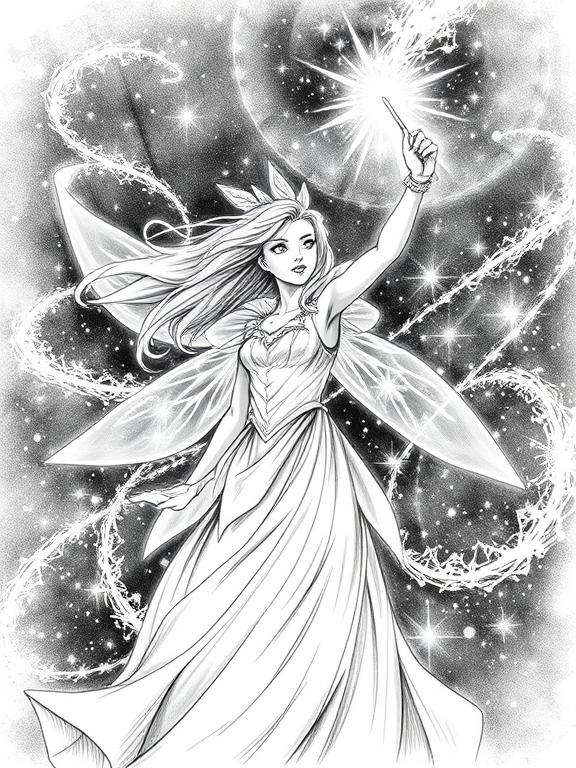
Seasonal Fairy Quartet
Design four fairies, each representing a different season. Spring fairy surrounded by blooming flowers, Summer fairy with sun-kissed skin and bright wings, Autumn fairy with leaf-colored wings and harvest elements, and Winter fairy with ice-crystal wings and snow.
This sketch series allows you to explore different color palettes and seasonal symbolism while maintaining consistency in your fairy design approach. Each fairy should embody their season’s characteristics in both appearance and mood.
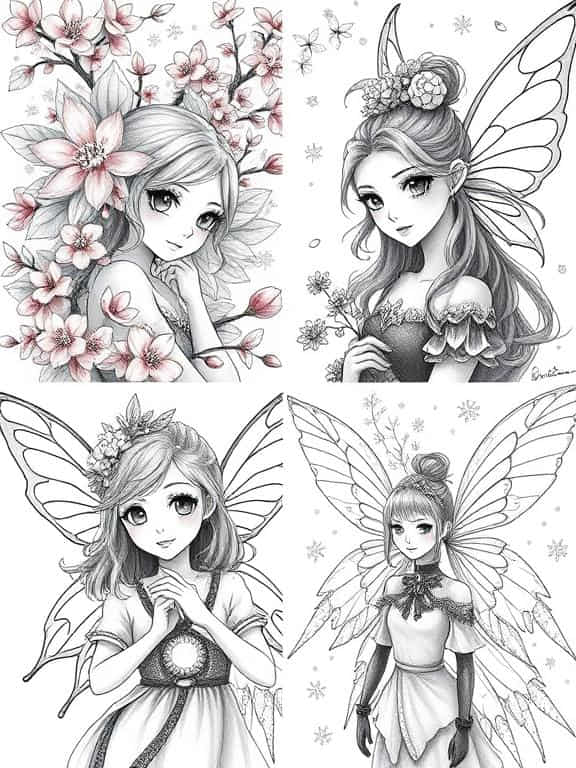
Dancing Fairy Circle
Illustrate a group of fairies holding hands in a circle, dancing under moonlight. This illustration captures community and celebration, with each fairy in a different dance pose while maintaining the circular formation.
Focus on the flow of movement around the circle, with hair and clothing suggesting the direction of the dance. Add magical elements like floating flower petals or glowing orbs to enhance the mystical atmosphere.
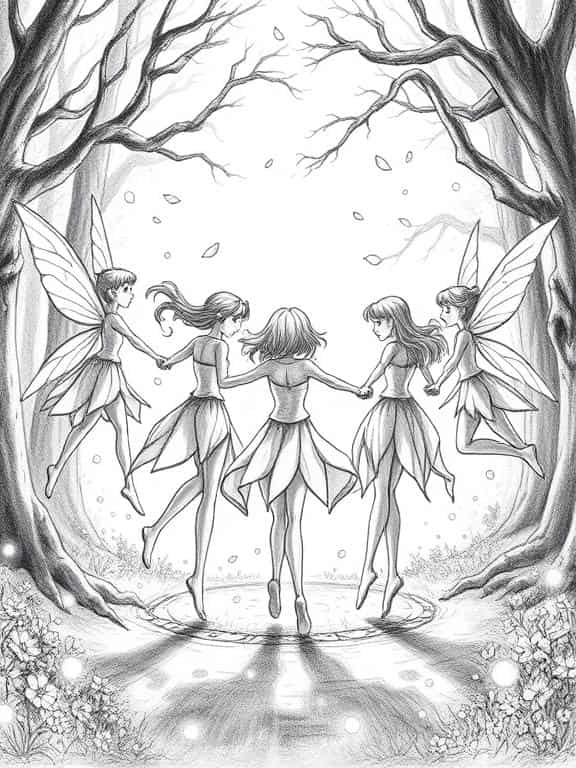
Fantasy Drawings: Beyond Traditional Fairy Tales
Steampunk Fairy
Combine Victorian-era mechanical elements with traditional fairy aesthetics. This drawing features a fairy with brass-and-copper mechanical wings, complete with gears, springs, and steam vents. Her clothing might include a corset with clockwork details and goggles perched on her head.
The challenge here is balancing the organic fairy elements with the hard, mechanical components. Use warm metallics and rich browns to create a cohesive color scheme that feels both magical and industrial.
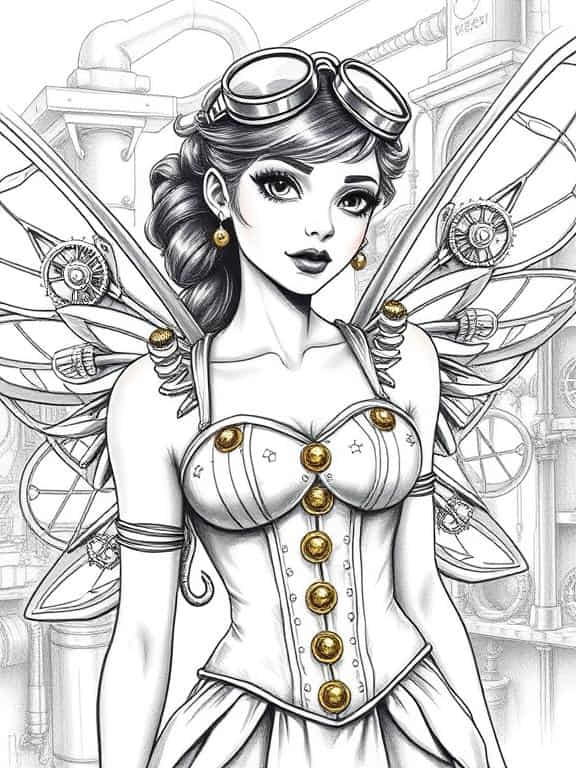
Cyber Fairy
Transport fairies into a futuristic digital realm where they exist as beings of pure energy and light. These fantasy creatures might have wings made of flowing digital code, with circuit-pattern tattoos glowing on their skin.
Use electric blues, bright greens, and stark whites to create a high-tech aesthetic. The fairy’s hair could stream like fiber optic cables, and her eyes might glow with digital light. This art style appeals to both kids and adults who love science fiction.
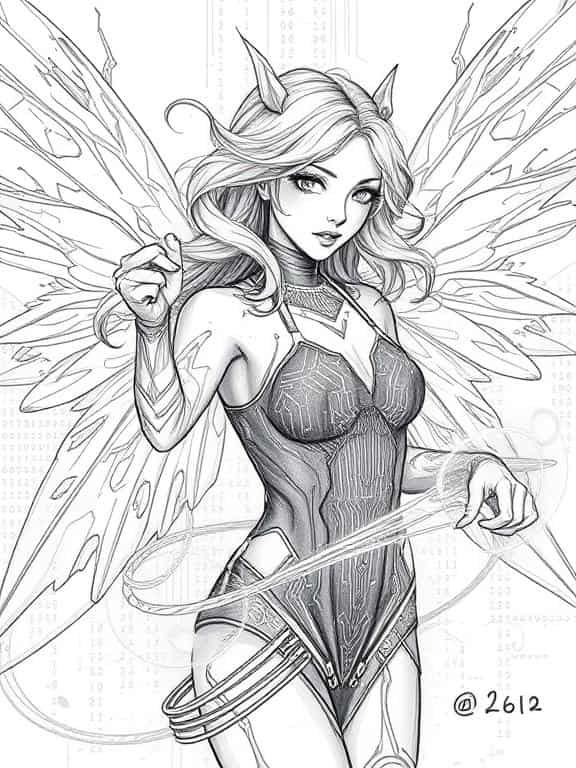
Gothic Fairy
Create a darker, more mysterious fairy with deep purples, blacks, and silver accents. This fairy might have bat-like wings, dark eye makeup, and clothing with lace and velvet textures. She’s not evil – just elegant and mysterious.
Focus on dramatic lighting and shadows to enhance the gothic atmosphere. The fairy’s expression should be enigmatic rather than sinister, maintaining the magical wonder while adding sophistication.

Elemental Fire Fairy
Design a fairy whose entire being is composed of flames and ember. Her hair flows like fire, her wings are made of flickering flames, and her skin glows with inner heat. This illustration challenges artists to work with warm colors and energy-based forms.
Use reds, oranges, and yellows in various intensities, with white-hot highlights at the flame centers. The fairy should appear to be generating her own light, casting warm glows on surrounding elements.
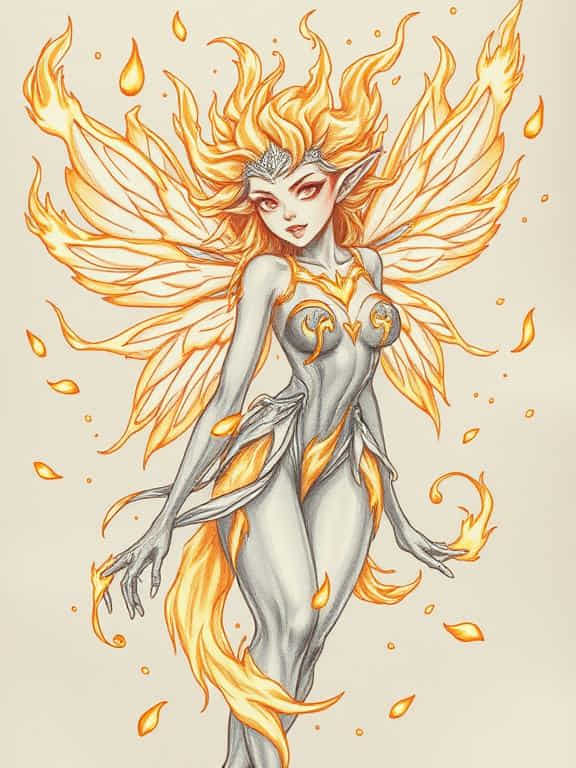
Underwater Fairy
Create an aquatic fairy with fins instead of wings, scales that shimmer like precious gems, and hair that flows like seaweed. She might ride a seahorse or play with schools of colorful fish.
This sketch requires understanding how things move and look underwater – hair and clothing should appear to float, and you might add bubbles and light refraction effects. Use blues and greens with silver highlights to create an underwater atmosphere.
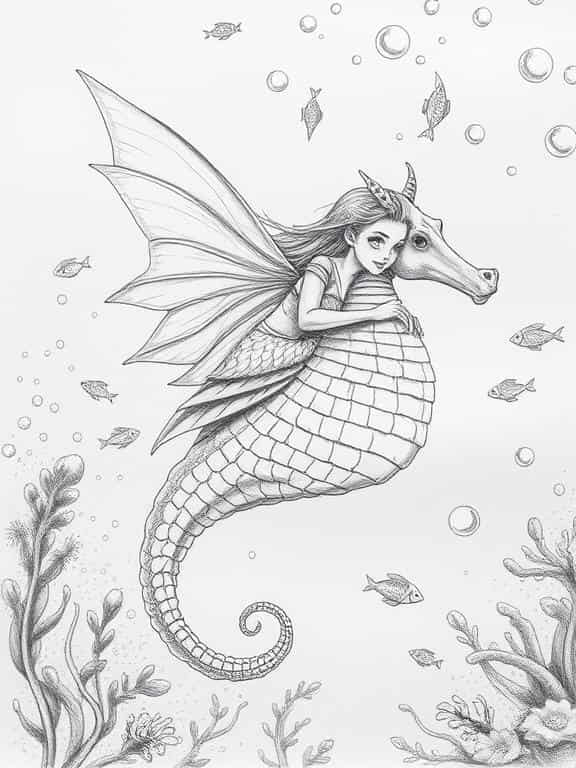
Fairy Artwork: Advanced Techniques and Compositions
Fairy Portrait Series
Create detailed portrait studies of individual fairies, focusing on facial features, expressions, and personality. These drawings allow you to practice realistic proportions while maintaining the magical elements that make fairies special.
Each portrait should tell a story through the fairy’s expression and details. Consider their age, background, and magical specialties when designing their features and accessories. This approach helps adult artists develop their portrait skills while maintaining creative freedom.
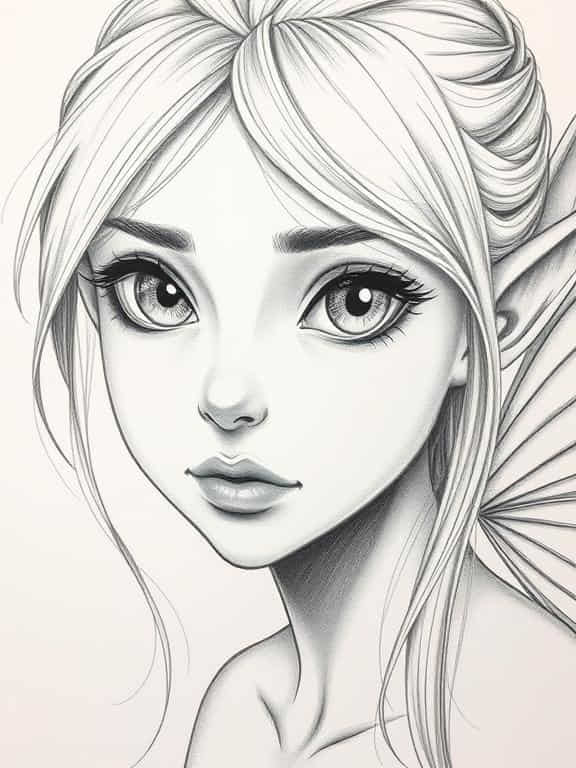
Fairy Habitat Illustrations
Design complete environments where fairies might live – inside hollow trees, under mushroom caps, or in flower gardens. These detailed artwork pieces combine architectural elements with natural settings, creating believable fairy worlds.
Include functional elements like tiny furniture, pathways, and storage areas. Think about how fairies might adapt natural elements for their needs – flower petal curtains, twig furniture, or shell dishware.
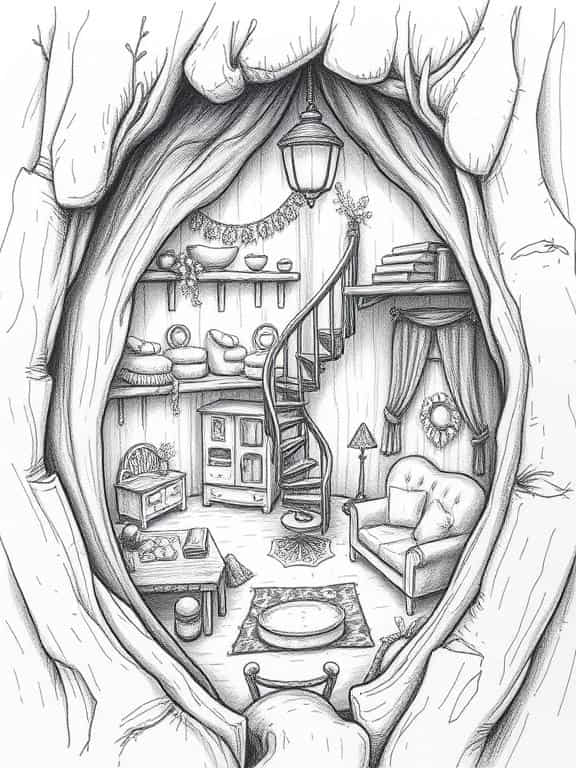
Fairy Action Scenes
Capture fairies in dynamic situations – racing through forests, rescuing trapped animals, or battling against storms. These illustrations require understanding anatomy in motion and creating compelling compositions that guide the viewer’s eye.
Use strong diagonal lines and overlapping elements to create depth and movement. The fairy’s pose should be dynamic and purposeful, with clothing and hair that respond to the action.
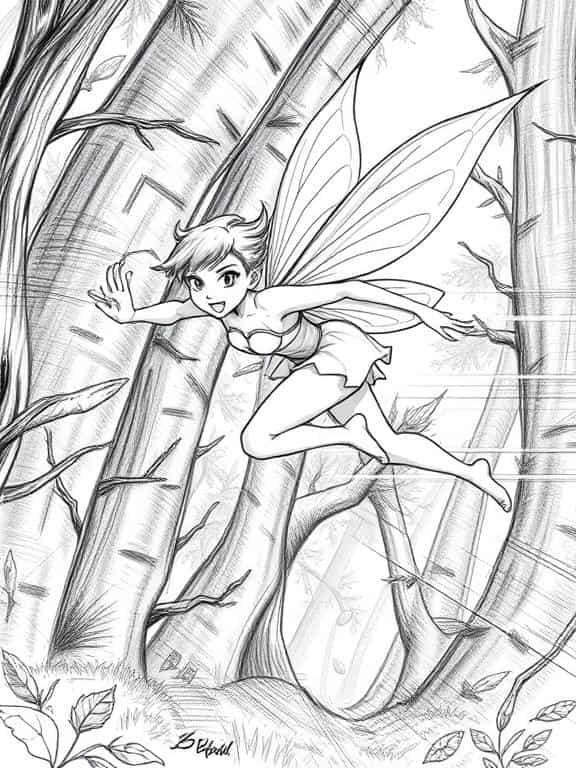
Magical Fairy Transformation
Show the moment when an ordinary person discovers they’re actually a fairy, with wings beginning to emerge and magic swirling around them. This fantasy concept allows for dramatic before-and-after elements within a single composition.
Create a clear focal point where the transformation is most intense, then use radiating lines and particle effects to show the magic spreading outward. The person’s expression should convey wonder and perhaps a touch of fear at this life-changing moment.
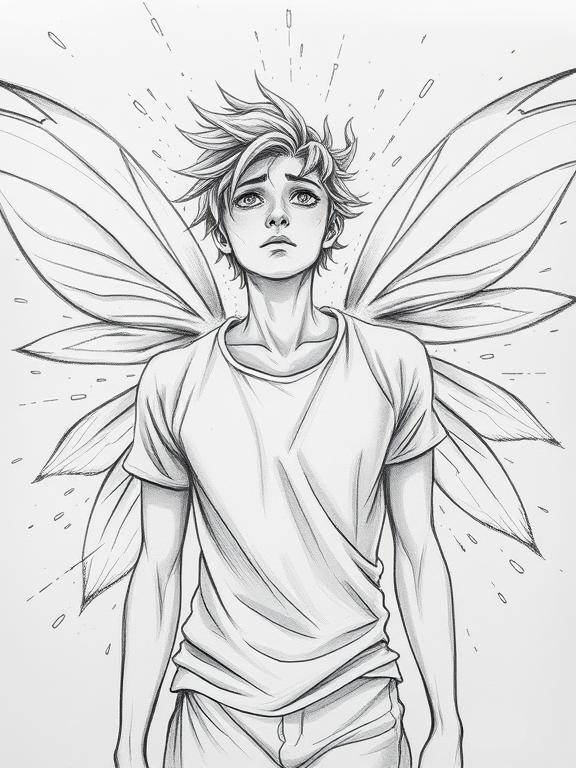
Tips for Bringing Your Fairy Art to Life
Start with Basic Shapes
Even the most complex fairy drawing begins with simple shapes. Use circles for heads, ovals for bodies, and basic triangles or ovals for wing shapes. This foundation helps maintain proper proportions as you add details.
Don’t worry about perfection in your initial sketch – focus on getting the overall pose and composition right before refining individual elements. Many professional artists create dozens of rough thumbnails before settling on their final composition.
Study Real-World References
While fairies are fictional, their individual elements come from reality. Study flowers for wing patterns, observe how fabric drapes for clothing, and look at real human proportions to make your fairies believable within their magical context.
Build a reference library of butterfly wings, flower petals, flowing hair, and expressive faces. This collection will become invaluable as you develop your personal fairy art style.
Experiment with Different Media
Try your fairy illustrations in various mediums – colored pencils for soft, dreamy effects; watercolors for translucent wings; digital art for glowing magical effects; or even mixed media combining traditional and digital techniques.
Each medium offers unique advantages. Watercolors excel at creating ethereal, translucent effects perfect for fairy wings. Colored pencils allow for precise detail work. Digital tools offer unlimited color options and special effects capabilities.
Practice Emotional Expression
Fairies should convey emotion through their facial expressions and body language. Practice drawing different emotions – joy, mischief, serenity, determination – to give your fairy characters personality and depth.
Remember that kids especially respond to clear, readable emotions in art. Exaggerate expressions slightly to ensure they come across clearly, even in small drawings.
The magic of fairy illustration lies not just in the final artwork, but in the creative process itself. Every sketch is a step into an enchanted world where anything is possible, and every finished piece carries a little bit of that magic into the real world.
So pick up your pencil, let your imagination take flight, and start bringing these magical beings to life on paper.
